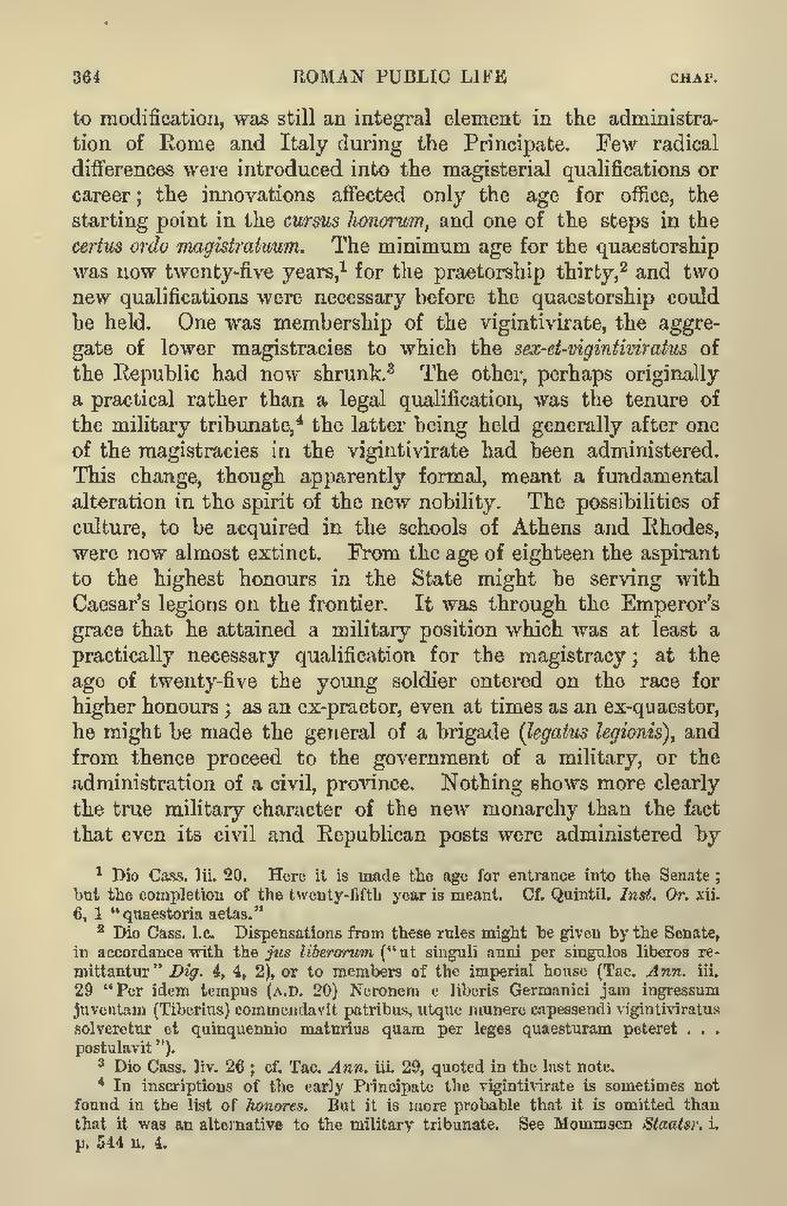to modification, was still an integral element in the administration of Rome and Italy during the Principate. Few radical differences were introduced into the magisterial qualifications or career; the innovations affected only the age for office, the starting point in the cursus honorum, and one of the steps in the certus ordo magistratuum. The minimum age for the quaestorship was now twenty-five years,[1] for the praetorship thirty,[2] and two new qualifications were necessary before the quaestorship could be held. One was membership of the vigintivirate, the aggregate of lower magistracies to which the sex-et-vigintiviratus of the Republic had now shrunk.[3] The other, perhaps originally a practical rather than a legal qualification, was the tenure of the military tribunate,[4] the latter being held generally after one of the magistracies in the vigintivirate had been administered. This change, though apparently formal, meant a fundamental alteration in the spirit of the new nobility. The possibilities of culture, to be acquired in the schools of Athens and Rhodes, were now almost extinct. From the age of eighteen the aspirant to the highest honours in the State might be serving with Caesar's legions on the frontier. It was through the Emperor's grace that he attained a military position which was at least a practically necessary qualification for the magistracy; at the age of twenty-five the young soldier entered on the race for higher honours; as an ex-praetor, even at times as an ex-quaestor, he might be made the general of a brigade (legatus legionis), and from thence proceed to the government of a military, or the administration of a civil, province. Nothing shows more clearly the true military character of the new monarchy than the fact that even its civil and Republican posts were administered by
- ↑ Dio Cass. iii. 20. Here it is made the age for entrance into the Senate; but the completion of the twenty-fifth year is meant. Cf. Quintil. Inst. Or. xii. 6, 1 "quaestoria aetas."
- ↑ Dio Cass. l.c. Dispensations from these rules might be given by the Senate, in accordance with the jus liberorum ("ut singuli anni per singulos liberos remittantur" Dig. 4, 4, 2), or to members of the imperial house (Tac. Ann. iii. 29 "Per idem tempus (A.D. 20) Neronem e liberis Germanici jam ingressum juventam (Tiberius) commendavit patribus, utque munere capessendi vigintiviratus solveretur et quinquennio maturius quam per leges quaesturam peteret . . . postulavit").
- ↑ Dio Cass. liv. 26; cf. Tac. Ann. iii. 29, quoted in the last note.
- ↑ In inscriptions of the early Principate the vigintivirate is sometimes not found in the list of honores. But it is more probable that it is omitted than that it was an alternative to the military tribunate. See Mommsen Staatsr. i. p. 544 n. 4.
